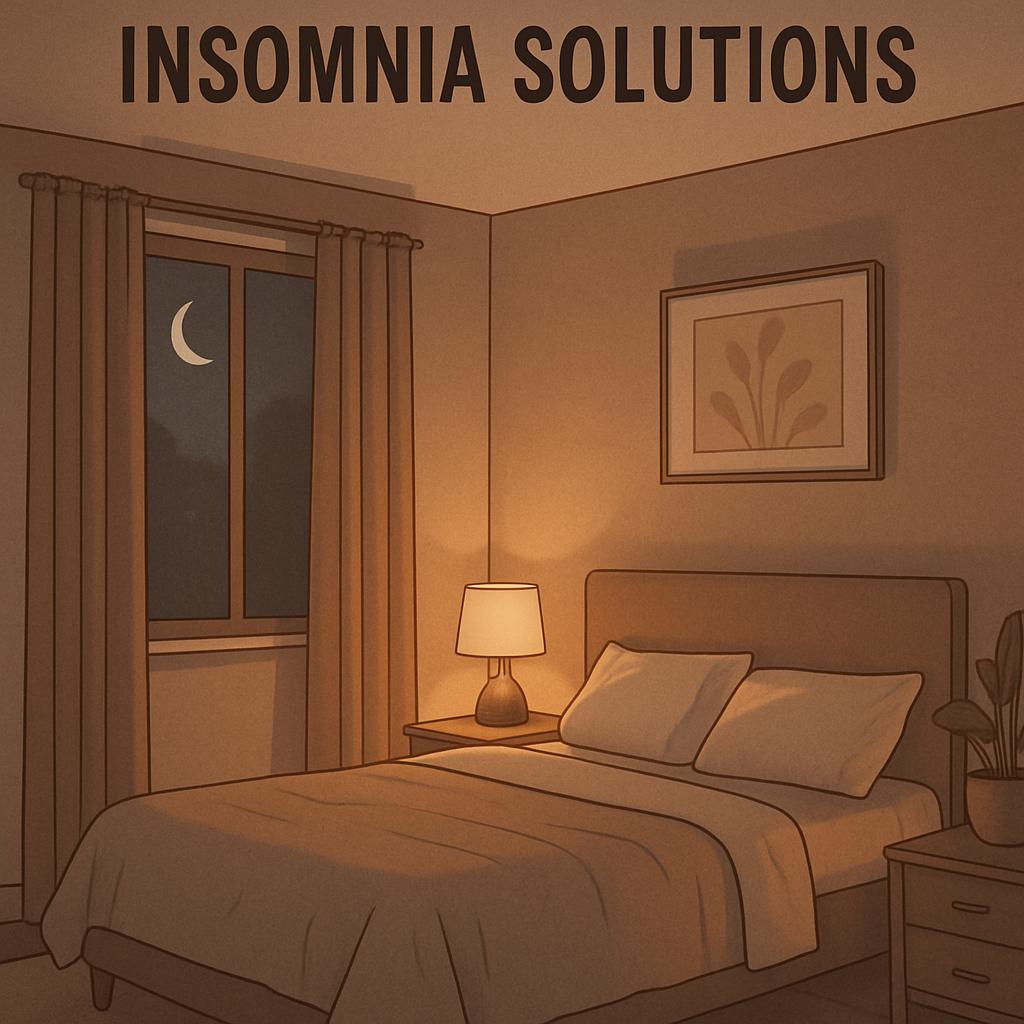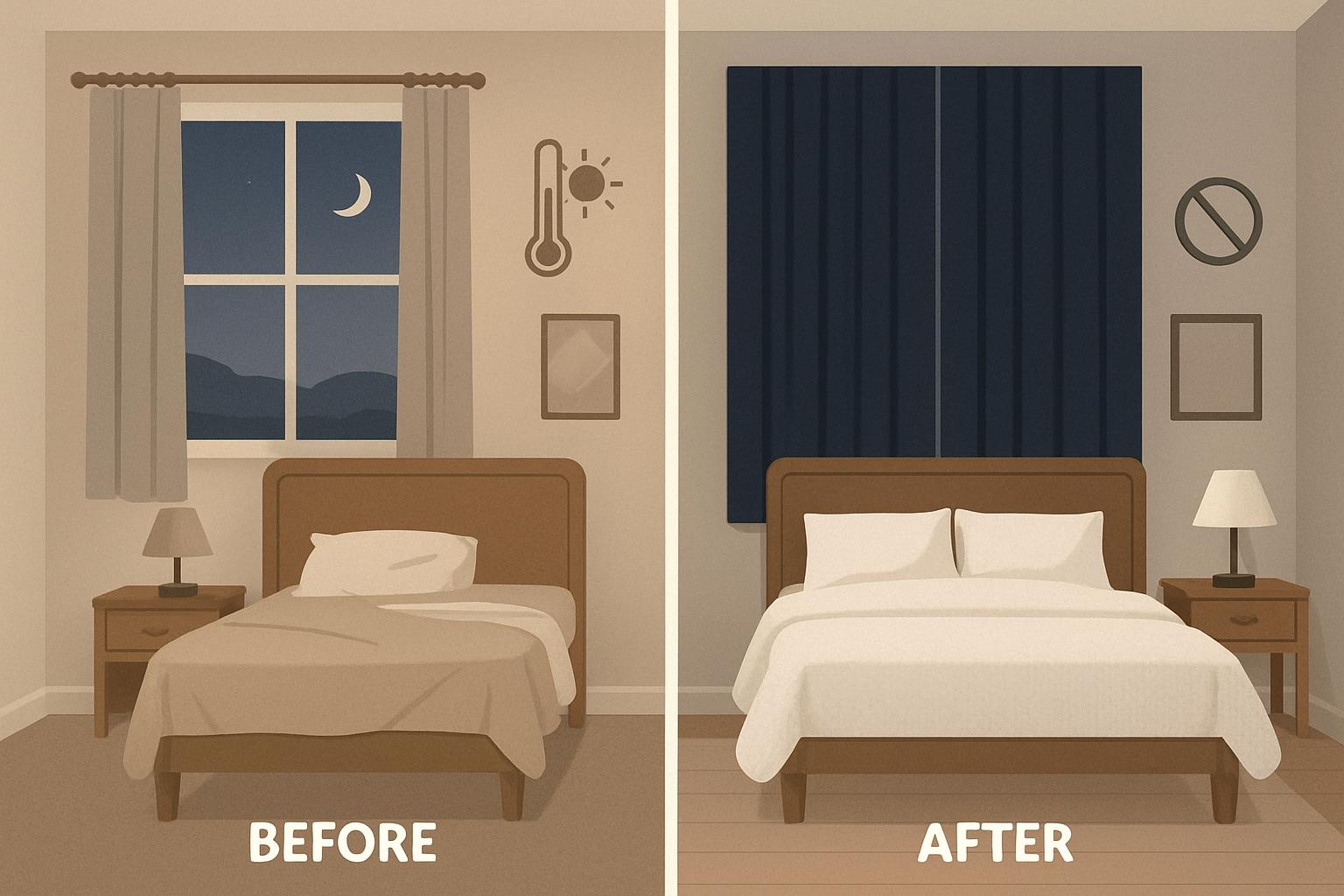
Medical Disclaimer: This article provides educational information about insomnia causes and treatment options. Always consult with healthcare professionals for proper diagnosis and treatment of medical conditions.
Understanding Insomnia
Insomnia is one of the most common sleep disorders, affecting approximately 30% of adults at some point in their lives. It's characterized by difficulty falling asleep, staying asleep, or waking up too early and being unable to return to sleep. The result is non-restorative sleep that impacts daytime functioning and quality of life.
Insomnia isn't just about the number of hours you sleep—it's about the quality of sleep and how you feel during the day. Some people function well on six hours of sleep, while others need nine hours to feel rested. The key is whether your sleep is adequate for your individual needs.
Types of Insomnia
Understanding the different types of insomnia helps identify appropriate treatment approaches:
By Duration
- Acute insomnia: Short-term sleep difficulties lasting days to weeks
- Chronic insomnia: Sleep problems occurring at least 3 nights per week for 3 months or more
- Episodic insomnia: Recurring periods of sleep difficulties
By Timing
- Sleep-onset insomnia: Difficulty falling asleep initially
- Sleep-maintenance insomnia: Difficulty staying asleep or frequent awakenings
- Early-morning awakening: Waking up too early and unable to return to sleep
- Mixed insomnia: Combination of multiple sleep difficulties
By Cause
- Primary insomnia: Sleep problems not directly caused by other conditions
- Secondary insomnia: Sleep difficulties resulting from other medical or psychiatric conditions
Clinical Definition: Chronic insomnia affects 10-15% of adults and is diagnosed when sleep difficulties occur at least 3 nights per week for 3 months or longer, causing significant daytime impairment or distress.

Psychological Causes of Insomnia
Mental and emotional factors are among the most common causes of sleep difficulties:
Stress and Anxiety
- Work-related stress: Job pressures, deadlines, and workplace conflicts
- Financial worries: Concerns about money and economic security
- Relationship problems: Marital issues, family conflicts, or social difficulties
- Life transitions: Major changes like moving, job changes, or loss
- Generalized anxiety: Chronic worry about various life aspects
- Performance anxiety: Worry about sleep itself creating a vicious cycle
Depression and Mood Disorders
- Major depression: Often includes early morning awakening and difficulty falling asleep
- Bipolar disorder: Sleep patterns can vary dramatically with mood episodes
- Seasonal affective disorder: Changes in sleep patterns with seasonal light variations
- Grief and loss: Bereavement can significantly disrupt sleep patterns
Trauma and PTSD
- Nightmares: Traumatic dreams disrupting sleep
- Hypervigilance: Heightened alertness making it difficult to relax
- Flashbacks: Intrusive memories interfering with sleep
- Avoidance behaviors: Fear of sleep due to trauma-related dreams
Stress-Sleep Cycle: Chronic stress increases cortisol levels, which can suppress melatonin production and fragment sleep. This creates a vicious cycle where poor sleep increases stress, which further worsens sleep quality.
Lifestyle and Environmental Factors
Daily habits and environmental conditions significantly impact sleep quality:
Poor Sleep Hygiene
- Irregular sleep schedule: Inconsistent bedtimes and wake times
- Daytime napping: Long or late naps affecting nighttime sleep
- Stimulating bedtime activities: Work, exercise, or exciting entertainment before bed
- Clock watching: Obsessing over time when unable to sleep
- Using bed for non-sleep activities: Work, eating, or watching TV in bed
Substance Use
- Caffeine: Consumed too late in the day or in excessive amounts
- Alcohol: Initial sedation followed by sleep fragmentation
- Nicotine: Stimulant effects and withdrawal symptoms affecting sleep
- Recreational drugs: Various substances disrupting normal sleep patterns
Environmental Disruptions
- Noise pollution: Traffic, neighbors, or household sounds
- Light exposure: Street lights, electronic devices, or early morning sun
- Temperature extremes: Rooms that are too hot or too cold
- Uncomfortable bedding: Poor mattress, pillows, or sleepwear
- Air quality: Stuffy, dry, or polluted air
Medical Conditions and Insomnia
Various health conditions can directly or indirectly cause sleep difficulties:
Sleep Disorders
- Sleep apnea: Breathing interruptions causing frequent awakenings
- Restless leg syndrome: Uncomfortable leg sensations disrupting sleep
- Periodic limb movement disorder: Involuntary leg movements during sleep
- Circadian rhythm disorders: Misalignment between internal clock and sleep schedule
Chronic Pain Conditions
- Arthritis: Joint pain and stiffness affecting comfort
- Fibromyalgia: Widespread pain and tender points
- Back pain: Spinal issues making comfortable positioning difficult
- Headaches and migraines: Pain and sensitivity disrupting sleep
- Cancer pain: Disease or treatment-related discomfort
Gastrointestinal Issues
- GERD (acid reflux): Heartburn and regurgitation disrupting sleep
- Irritable bowel syndrome: Abdominal pain and bathroom urgency
- Peptic ulcers: Stomach pain often worse at night
- Inflammatory bowel disease: Symptoms affecting sleep quality
Respiratory Conditions
- Asthma: Breathing difficulties and coughing at night
- COPD: Chronic breathing problems affecting sleep
- Allergies: Nasal congestion and breathing difficulties
- Sleep-related breathing disorders: Various forms of disordered breathing
Hormonal and Age-Related Factors
Hormonal changes throughout life can significantly impact sleep patterns:
Women's Health Issues
- Menstrual cycle: Hormonal fluctuations affecting sleep quality
- Pregnancy: Physical discomfort, hormonal changes, and frequent urination
- Menopause: Hot flashes, night sweats, and hormonal shifts
- Postpartum period: Infant care demands and hormonal changes
Aging-Related Changes
- Sleep architecture changes: Less deep sleep and more frequent awakenings
- Circadian rhythm shifts: Earlier bedtimes and wake times
- Medical conditions: Increased prevalence of health issues with age
- Medication effects: More medications with sleep-affecting side effects
Other Hormonal Conditions
- Thyroid disorders: Both hyperthyroidism and hypothyroidism affect sleep
- Diabetes: Blood sugar fluctuations and related complications
- Adrenal disorders: Cortisol imbalances affecting sleep-wake cycles
Medical Evaluation: If insomnia persists despite good sleep hygiene, consult a healthcare provider. Underlying medical conditions cause or contribute to insomnia in approximately 50% of chronic cases.
Medications and Insomnia
Many medications can interfere with sleep as a side effect:
Stimulating Medications
- Antidepressants: Some types can be activating, especially SSRIs
- Corticosteroids: Prednisone and similar medications
- Bronchodilators: Asthma medications like albuterol
- Decongestants: Pseudoephedrine and similar compounds
- ADHD medications: Stimulants used for attention disorders
Medications Affecting Sleep Architecture
- Beta-blockers: Can cause vivid dreams and sleep disruption
- Diuretics: Increase nighttime urination
- Some blood pressure medications: Various effects on sleep patterns
- Antihistamines: Paradoxical stimulation in some people
Withdrawal Effects
- Sleep medication withdrawal: Rebound insomnia when stopping sleep aids
- Antidepressant discontinuation: Sleep disruption during withdrawal
- Substance withdrawal: Alcohol, drugs, or even caffeine withdrawal
Genetic and Biological Factors
Some people may be predisposed to insomnia due to biological factors:
Genetic Predisposition
- Family history: Insomnia can run in families
- Chronotype variations: Natural preferences for sleep timing
- Stress sensitivity: Genetic differences in stress response
- Neurotransmitter function: Variations in brain chemistry
Neurological Factors
- Hyperarousal: Overactive nervous system
- Brain injury: Traumatic brain injury affecting sleep centers
- Neurodegenerative diseases: Parkinson's, Alzheimer's, and related conditions
- Seizure disorders: Epilepsy and related conditions
Identifying Your Insomnia Triggers
Understanding your specific causes is crucial for effective treatment:
Self-Assessment Questions
- When did your sleep problems begin?
- What was happening in your life at that time?
- Do you have difficulty falling asleep, staying asleep, or both?
- What thoughts go through your mind when you can't sleep?
- How is your stress level currently?
- What medications or supplements are you taking?
- How would you describe your sleep environment?
Sleep Diary Benefits
- Pattern recognition: Identify trends and triggers
- Lifestyle correlation: Connect daily activities with sleep quality
- Treatment tracking: Monitor improvement with interventions
- Professional consultation: Provide valuable information to healthcare providers
Treatment Approaches for Insomnia
Effective insomnia treatment often involves addressing underlying causes:
Cognitive Behavioral Therapy for Insomnia (CBT-I)
- Sleep restriction: Limiting time in bed to improve sleep efficiency
- Stimulus control: Associating bed with sleep only
- Cognitive restructuring: Changing negative thoughts about sleep
- Relaxation training: Techniques to reduce arousal and anxiety
- Sleep hygiene education: Optimizing sleep environment and habits
Lifestyle Modifications
- Regular exercise: Moderate activity improving sleep quality
- Stress management: Techniques like meditation, yoga, or counseling
- Diet optimization: Avoiding stimulants and heavy meals before bed
- Sleep schedule consistency: Regular bedtimes and wake times
Medical Interventions
- Treating underlying conditions: Addressing medical causes of insomnia
- Medication review: Adjusting or changing sleep-disrupting medications
- Sleep medications: Short-term use for specific situations
- Hormone therapy: For menopause-related sleep issues
Prevention Strategies
Preventing insomnia is often easier than treating it once established:
Stress Management
- Develop healthy coping strategies for life stressors
- Practice regular relaxation techniques
- Maintain social support networks
- Seek professional help for mental health concerns
Healthy Sleep Habits
- Maintain consistent sleep schedules
- Create a comfortable sleep environment
- Limit caffeine and alcohol consumption
- Get regular exercise, but not close to bedtime
- Manage light exposure appropriately
When to Seek Professional Help
Consider consulting a healthcare provider if:
- Sleep problems persist for more than 3-4 weeks
- Insomnia significantly impacts your daily functioning
- You experience excessive daytime sleepiness
- You have symptoms of depression or anxiety
- You suspect an underlying medical condition
- Self-help strategies haven't been effective
- You're using alcohol or over-the-counter sleep aids regularly
The Road to Better Sleep
Recovery from insomnia is often a gradual process that requires patience and persistence:
Realistic Expectations
- Improvement may take weeks or months
- Progress isn't always linear
- Some setbacks are normal during recovery
- Focus on overall trends rather than individual nights
Long-term Success
- Continue healthy sleep habits even after improvement
- Address new stressors promptly
- Maintain regular exercise and stress management
- Seek help early if sleep problems return
Conclusion
Insomnia is a complex condition with multiple potential causes, ranging from psychological stress to medical conditions and lifestyle factors. Understanding the underlying causes of your sleep difficulties is the first step toward effective treatment.
While insomnia can be frustrating and exhausting, it's important to remember that it's highly treatable. Whether through lifestyle modifications, cognitive behavioral therapy, medical treatment, or a combination of approaches, most people can achieve significant improvement in their sleep quality.
Don't suffer in silence with chronic sleep problems. If self-help strategies aren't providing adequate relief, seek professional help. With proper diagnosis and treatment, you can overcome insomnia and enjoy the restorative sleep your body and mind need to function at their best.
← Back to Sleep Topics